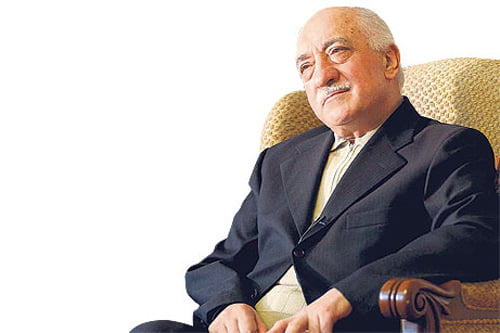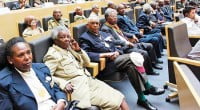Islam-state-society relationship: the Turkish model

Date posted: April 2, 2013
Dr. Husnul Amin*
Countries like Tunisia and Egypt and their respective Islamist movements have positively revised their strategies taking inspiration from the Turkish model of society and statecraft in which both modern trends and Islamic values can coexist in the context of a pluralist society.
| While walking in the streets and bazaars of Istanbul, my Turkish friend Osman, a volunteer of the Hizmet movement, had more clarity of the issues and problems confronted by the contemporary Muslim world than most of our religiously trained scholars. I found Osman, a clean-shaven young Turk, to be a devout Muslim. At prayer time, he would stop walking and offer his regular prayers. Then he would spend a considerable time in optional prayers and dhikr. But he did not give me the impression that I was bound to offer prayers with him. Apart from his inward religiosity and spirituality, Osman had the ability and openness of mind to accommodate the religious and cultural diversity all around him. |
Whereas an ever-growing number of Islamic social forces in the Muslim world are looking towards Turkey and its Justice and Development Party to replicate its workable model of democratisation as well as to imitate Islamic social movements like the Fethullah Gulen.
Countries like Tunisia and Egypt and their respective Islamist movements have positively revised their strategies taking inspiration from the Turkish model of society and statecraft in which both modern trends and Islamic values can coexist in the context of a pluralist society. Yet, one should not be surprised that this wisdom is not found in Pakistan and its self-righteous Islamist movements.
On the contrary, Pakistan and its Islamic forces (both intellectual and social) have gradually become irrelevant in the larger context of the Islam-state-society relationship. The future scene of state and societal configuration in relation to Islamic values will be determined and shaped by the Turkish model and not by the ‘Islamic’ republic of Pakistan. Modern Turkey symbolises this new trend and the Islamic cosmopolitan culture in Istanbul presents the microcosm of this Turkish model.
Based on my recent visit to Istanbul, I feel that the most interesting part of the recent Turkish upsurge is not restricted to its economic development and the strengthening of democratisation but mainly relates to achieving a considerably beautiful balance between Islam and the needs of a pluralist and open society. A society that feels pride in its Ottoman heritage, projects its art and music, welcomes its guests from diverse cultures and backgrounds and tolerates the manifestations of leisure and pleasure in the streets of Istanbul. At least for now, and in the foreseeable future, Turkey has left us far behind in the context of Islam’s role and function in a modern society.
If, on the one hand, the Turkish society has pushed back its military and Kemalist elite, on the other, it could develop a Turkified Islam that better accommodates the needs and concerns of Turkish society. In contrast, Pakistan – this ‘laboratory of Islam’ – has miserably failed in developing an indigenous and pragmatic understanding of Islam. It seems then that the framework of a modern Muslim society will be set by no other Muslim nation than Turkey.
Caught in a historical process of either transforming and controlling state and society or resolving intellectual subtleties, Islam in Pakistan seems to have lost its creative energy. Every intellectual effort ultimately ends up one way or the other in constructing an empire of ideas that is more exclusive, authoritative and absolutist. The struggle for authenticity and claims to the final truth of everyone’s interpretation could not liberate us from despondency and we failed to appreciate the needs of a cosmopolitan culture. The quiet revolution in Turkey – achieved by social movements like the Hizmet movement of Fethullah Gulen – preaches tolerance, freedom, equality and service to humanity.
Islam and society in Turkey, particularly in Istanbul, seem to have achieved a considerably attractive balance. In a number of problematic issues in the context of Islam-state and Islam-society relationships, we are all now bound to ultimately depend on the Turkish experience of an Islamic secularism. The Pakistani experience of top-down Islamisation and social control has nothing to contribute to the development of an emerging Islamic cosmopolitan culture across the Middle East. Despite our claims to authenticity and purity of Islam, as practiced in Pakistani society and manipulated by the state since its inception, the final scene is to be set and shaped by the everyday Islam/lived Islam more in the manner of the Turkish elites and the Turkish bazaar.
Here again the Pakistani religious scholarship engaged day and night in theological discourses and textual intricacies seems to have lost ground in terms of contributing to the emerging Muslim cosmopolitan culture. In the current religious landscape, even one of the few sane and rational voices, Ghamidi seems to have lost his original direction and has thus finally ventured into re-Islamisation of society.
The problem with Pakistani religious scholarship is that it tries to make sense and develop an understanding of Pakistan’s culture and society using a social theory mostly derived from doctrinal texts and not from everyday practice of common Muslims. Such efforts in our religious articulations to define, judge and explain society in the light of doctrinal sources have further complicated a set of otherwise simple and intelligible issues.
While walking in the streets and bazaars of Istanbul, my Turkish friend Osman, a volunteer of the Hizmet movement, had more clarity of the issues and problems confronted by the contemporary Muslim world than most of our religiously trained scholars. I found Osman, a clean-shaven young Turk, to be a devout Muslim. At prayer time, he would stop walking and offer his regular prayers. Then he would spend a considerable time in optional prayers and dhikr. But he did not give me the impression that I was bound to offer prayers with him. Apart from his inward religiosity and spirituality, Osman had the ability and openness of mind to accommodate the religious and cultural diversity all around him.
Hundreds of thousands of tourists from diverse cultures travel to Istanbul. A number of critical observations can be made on their dress codes and leisure practices in the streets of Istanbul. I constantly kept my gaze fixed on Osman’s response to these ‘immodesties’ as we in Pakistan would label them. Osman told me that this was the domain of personal freedoms and that any use of force by vigilante groups is counter-productive.
Upon my suggestion that most Pakistani religious circles consider ‘immodesty’ and ‘vulgarity’ to be the most daunting challenge to the Muslim world, my Turkish friend added that such things can be normally categorised as sins and it may not be a very good idea to attack them. He added that there are three major problems of the Muslim countries: iftiraq (internal divisions), faqr (poverty) and jahala (illiteracy). He declined to accept ‘immodesty’ as a concrete problem for the Muslim Ummah.
Nearly all Muslim societies are facing burgeoning new middle classes, migration, urbanisation and globalisation. These trajectories and processes have their own challenges and opportunities. We cannot stop the development of cities and the introduction of modern lifestyles associated with an urban environment. Cultural and economic globalisation come with their own challenges and opportunities.
The question is: how would you reconcile inward religiosity with the public manifestations of leisure, music, art and dress code? A textual treatment of these issues – approved by most Pakistani clergy – may never be open to the opportunity of a cosmopolitan culture. The Turkish experience of creating an intricate balance between Islam as a value system and the state and society seems to be the only logical response – at least in the near future.
To conclude, too much engagement with intellectual rigour and doctrinal intricacies – as pursued in subcontinental Islamic scholarship – and top-down Islamisation campaigns including Zia’s Islamisation project, the Afghan jihad and vigilante activism of Islamist groups have distorted the intricate balance between Islam, local culture and society. This ill-conceived and illogical struggle of social control and increasing share in the social power has resulted into a social reconfiguration characterised by intolerance and superficial religiosity.
Our intellectual and political elite fail to understand and define this distorted social configuration. Our religious clergy and extreme right-wing intelligentsia insist on accepting and explaining this situation. Despite our louder claims to project Pakistan as the leader of Islamic countries, our textual religiosity has finally dragged us to a point where we are only at the receiving end. I hope our Islamic social forces learn from the Turkish model.
* The writer is a post-doctoral research fellow at the Berlin Graduate School of Muslim Cultures and Societies, Berlin, Germany.Email: [email protected]
Source: The International News Tuesday, April 02, 2013 (Original article’s title is “Our textual religiosity.”
Tags: Hizmet movement, Pakistan
Tags: Asia | Hizmet (Gulen) movement | Islamic World | Pakistan |
























